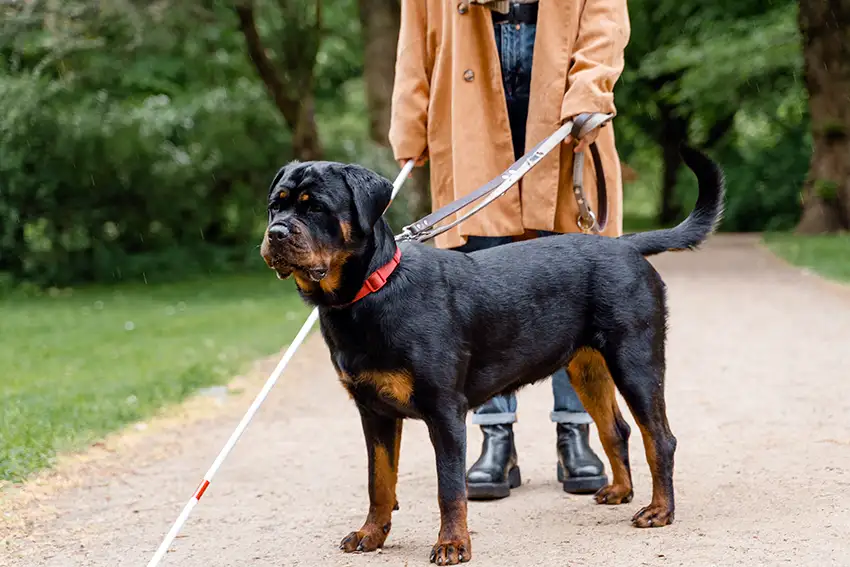Majestic in stature with its massive muscles, the Rottweiler can be a gentle giant or an intimidating canine, depending on its training and breeding. With a natural instinct towards protection, early socialisation and consistent leadership will determine its temperament.
Rottweiler Training
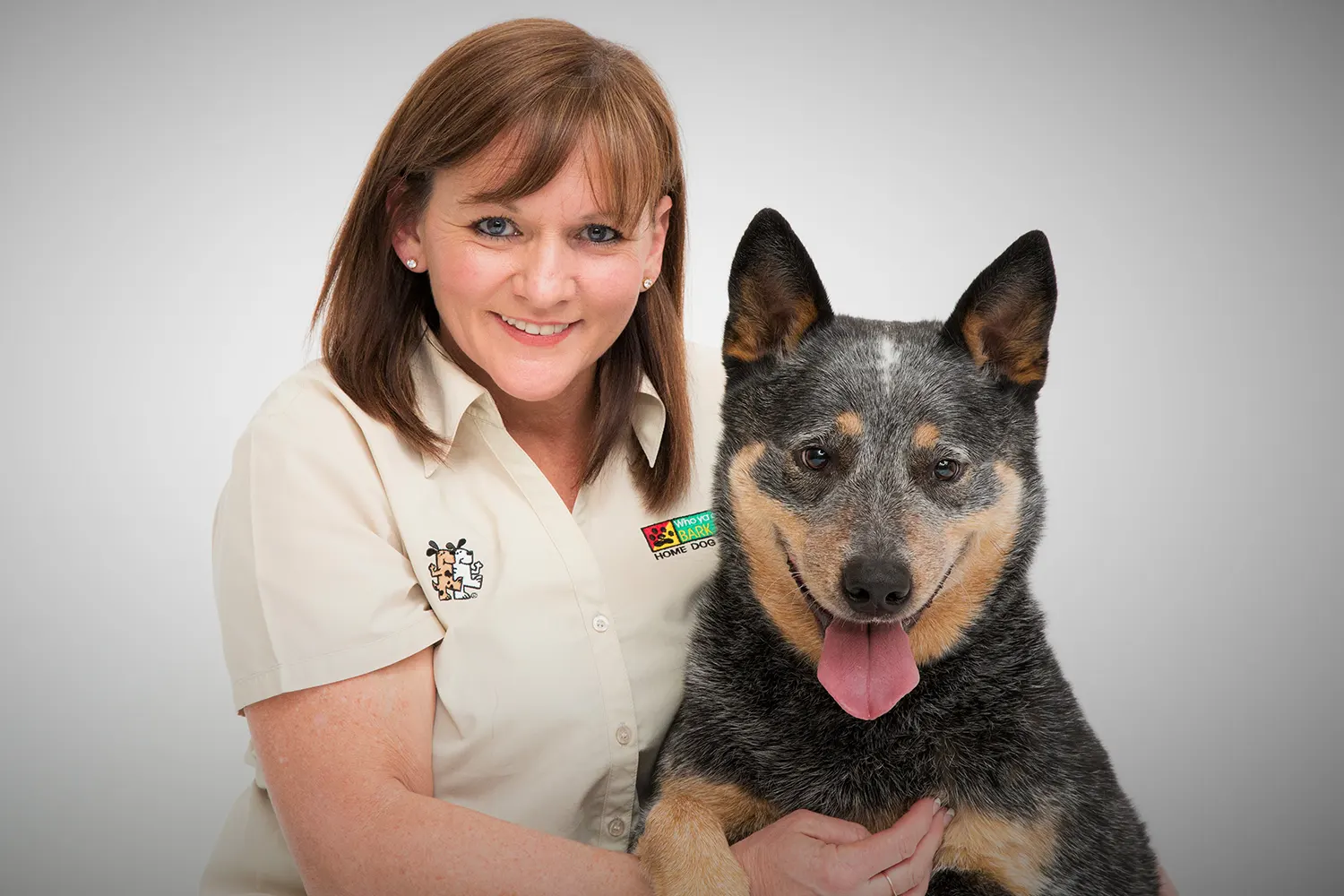
Bark Busters International Head of Training - Donna Ryan
Rottweilers are large mighty dogs and thought to be descended from the fighting Mastiffs used by Roman and other ancient armies. They are primarily working dogs, so like other working dogs, if you aren't exercising their brains and giving them challenges, they will make up their own entertainment. This can lead to destructive behaviours like the stuffing from your sofa spread all over your living room. Rottweilers can be independent and headstrong which means they need consistent Rottweiler Training that is constantly reinforced. If you give them an inch, they will quickly take a mile and be in control. If you don't teach them that answering the door is your responsibility, they will never calmly let anyone come into your home! Proper Rottweiler Training addresses these issues by establishing clear boundaries and respectful behaviour.
Rottweilers are very smart, as are most working dogs, and some challenge you every day to test your mettle. A typical challenge might be to lay down when you want to walk, or they may let you know that they want to go out to do their business and then change their mind when you open the door. They just change things slightly to test if you are going to call them out on this behaviour. If you don't correct this behaviour as soon as possible, getting their cooperation will become more and more difficult. However, if you do follow through when they 'test' you, you will gain their respect and establish your leadership. You may be tested daily and if and how you respond to these tests matter, and how quickly they will see you as a leader. Consistent Rottweiler Training ensures that these daily tests strengthen your relationship rather than undermine it.
As much fun as it would be to wrestle with your Rottweiler, Bark Busters strongly recommends you do not do this. While many dogs can safely wrestle with their owners, some don't know when to stop or who it's not ok to wrestle with. Rottweilers are not a dog to make this mistake with, so it is much better to be safe than sorry. It is never a good idea to get physical with any dog, but it is particularly dangerous to get physical with Rottweilers. You need to teach them to respect your leadership and to respond to voice control, so you are not left with this option. You should not need to resort to grabbing their collar to get them off the sofa or bed. They should do this willingly on command. Expert Rottweiler Training teaches dogs to respond willingly to commands and understand their role in the household hierarchy.
While they are wonderful dogs, they might not be the right dogs for novice dog owners or for those who just want to love their dogs. Living with a Rottweiler can sometimes be a challenge, but those who have become accustomed to this breed will have no other.
These dogs need a complete and balanced relationship with their human pack. This means mutual love, trust and respect. Problems occur when there is misunderstanding or miscommunication. Bark Busters dog behaviour experts can teach pet parents to effectively communicate and to "speak dog," which is an essential part of successful Rottweiler Training.
Physical Characteristics

Rottweilers are a large dog and have developed an unfair reputation for viciousness as a "bully breed". Their protectiveness is often misunderstood as aggressiveness. Weighing from 38 to 61 kgs and standing between 30cms to 60cms tall, Rottweilers can look imposing. With a well-recognised large head and its distinctive black and tan markings, Rottweilers are great guard dogs, but can have a mellow and loving heart. Their personality often depends on their owner. You want a dog that is calm and watchful, but not nervous or hyperactive.
They are slightly longer than they are tall with ears that are triangular and noses that are black and wide. Their lips and inside of their mouth are also black. Their eyes are almond-shaped and dark brown. Their fur is black with unique markings over their eyes, cheeks, chest, lower legs and under the tail.
Due to their size, even the gentlest Rottweiler can knock down small children and the elderly who bump into them, so it’s important they are supervised. The Rottweiler's strength makes them an excellent police dog, cattle herders and they excel at tasks involving agility and endurance too.
History
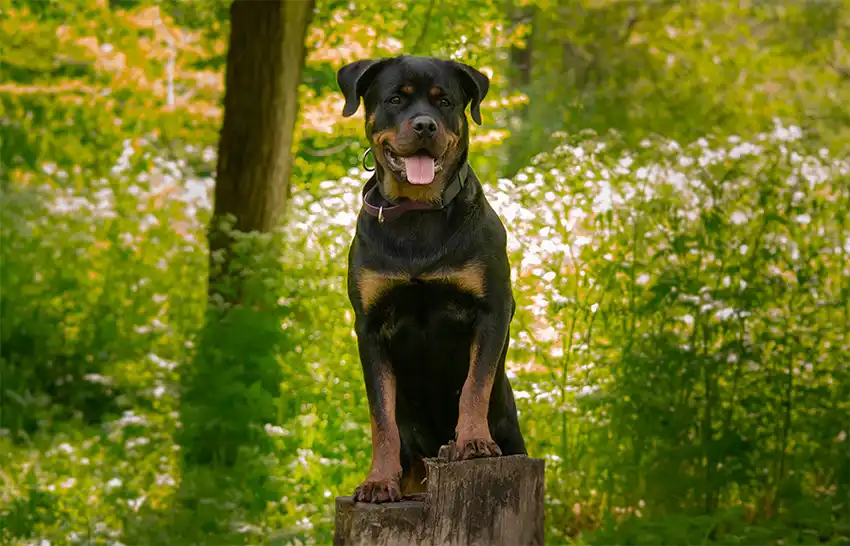
Although its exact origins are murky, the Rottweiler, or Rotties as they are fondly known, are thought to descend from the Molossus dog of Italy, a Mastiff-type dog bred to fight lions in Roman amphitheatres, as well as being used to pull carts and herd cattle by the Roman army on their campaigns. As the Roman empire fell, many of the dogs found themselves in the town of Rottweil, in Germany. The dogs were put to work and used to herd cattle from field to field and to protect the herds from bandits and rustlers. It is here where they earned the nickname Rottweiler Metzgerhund, or butcher's dog of Rottweil. As donkey carts replaced dog carts, and later railway lines replaced the need for animals pulling carts, Rottweilers were on their way to extinction until a resurgence in the 20th Century when they were recognised as potential police dogs for their intelligence, loyalty, and strength.
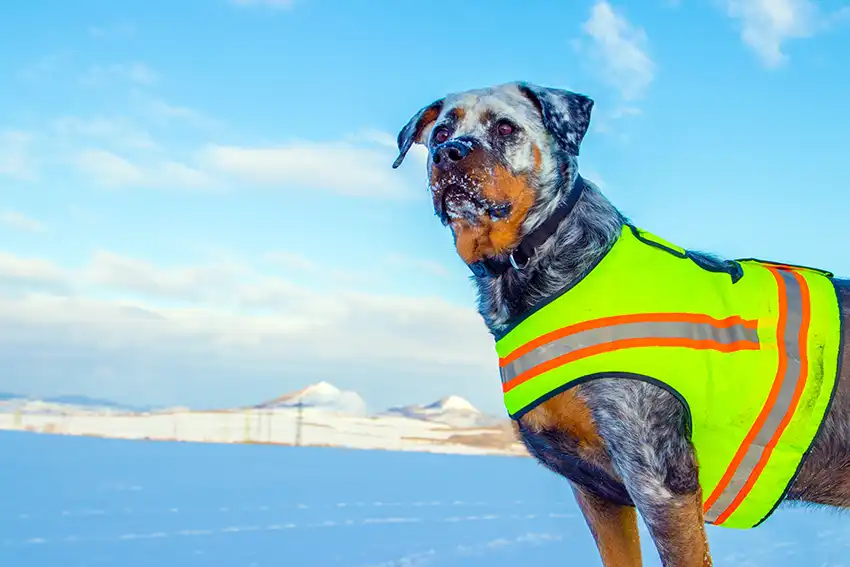
They found work as protection dogs, search and rescue dogs and were also one of the first guide dogs too. Their honourable career also saw them perform search and rescue tasks at disasters such as the World Trade Centre.
It is remarkable that the Rottweiler has had many roles over hundreds, if not thousands of years, and its temperament and looks have not really changed a great deal from its humble 'Butcher's Dog' beginnings, to become the loved family pet that we know today.
Personality and Temperament
Rottweilers are bold and confident and can even be shy around strangers. However, if someone threatens its family, it can be prone to attack. How a Rottweiler acts on its protectiveness will depend on its training. If it has been well socialised around children, strangers and other pets, Rottweilers can be well adjusted and well behaved at home and in public settings. If its leadership is weak and inconsistent or it has been trained to fight, Rottweilers can be very dangerous and seriously injure others.
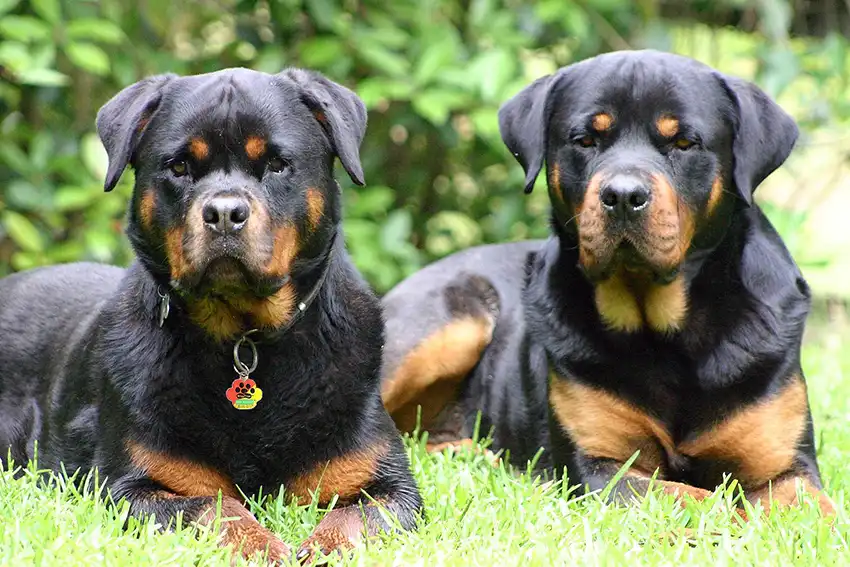
Bark Busters dog trainers teach dog owners to establish themselves as leaders from the start. Being a leader means clear communication, setting consistent rules and boundaries and applying structure to your dog's life. We have seen Rottweilers whose aggression can be dangerous to even the good guys and Rottweilers that are lovable family companions. The difference is in the leadership abilities of their owners. You want your dog to respect you as a leader but not fear you. With a dog as powerful and intelligent as the Rottweiler, it is important that you take control of your dog's behaviour.
Two Rottweilers from the same litter can be very different. One may have a lot of energy, while the other is content to be a lap dog. Never assume that because your Rottweiler loves your children that they love all children. Rottweilers should always be supervised around familiar and unfamiliar children, because if they are roughhousing, your dog may misjudge the sense of danger. Dogs don't see children as miniature adults. They see them as unpredictable creatures with loud voices who pull on their tail and try to sit on them.
Rottweilers can be very territorial and will never let strangers near its family unless its pet parents welcome them.
Remember that dogs are not born mean. Despite some media reports, Rottweilers are not inherently vicious. Well raised Rotties can be gentle giants if properly taught and managed. Many people will misjudge the breed and, in some countries, and cities they have been banned. Every Rottweiler dog owner who loves the breed can redeem its reputation by educating them to obey and respect people.
Grooming
Rottweilers have a double coat of medium length fur which is coarse to the touch. If you want its coat to be shiny, brush it once a week to penetrate the natural oils. Twice a year the Rottweiler will shed its coat heavily and may require more brushing. Unlike humans, Rottweilers require little bathing. Bathing too much will destroy the natural oils in the coat.
Always check your Rottweiler's ears for wax buildup or infection. Always use a cotton ball and never a cotton bud. Keep a check on their teeth for tartar build up and gingivitis and trim their nails regularly in necessary.
Breed Traits
No two Rottweilers are alike, but there are some traits common to the breed. Some are very reserved while others will delight you with their antics:
Socialisation
If a well-behaved Rottweiler is what you want, guidance and structure will be key. If possible, start training your puppy the minute they step through your front door. Puppies are like sponges, eager to soak up all the information you provide. Socialising means not only introducing your dog to children, pets and strangers, but creating rules and boundaries for what is acceptable and what is not.

Many dog owners do not want to socialise their dogs for fear of it becoming too "friendly". This is misguided. When your puppy comes home, it is important to start slowly by introducing it to family members. You can then introduce friends and even other dogs whose owners have like-minded training philosophies. Ensure you only introduce your puppy to other dogs that have been vaccinated to prevent exposure to Parvo and other diseases. Be wary of other dogs that are high energy because it may frighten an inexperienced puppy.
Socialising your dog does not have to be a chore. For instance, if you are running errands and the temperate and weather is ok, take the dog along too. For the first couple of weeks, while you are toilet training and teaching rules and boundaries, you will need to spend more time with your puppy. You want your dog to fit into your life, not the other way around.
Any dog, no matter how well socialised can start misbehaving and engaging in destructive behaviours if bored. Don't put your Rottweiler outside and forget about them. A tired dog is a happy dog, so it's important to train your Rottweiler's body and mind too.
Behaviour Problems
The two predominant behaviour problems that Bark Busters trainers are called in to address with Rottweilers are aggression and overprotectiveness.
Despite this, Rottweilers are very trainable and are high on Bark Busters list of 'easy to train' breeds. They don't take well to unstructured environments, so you need to be the one in control or they will quickly fill this slot. Before you know it your Rottweiler will be answering the door and frightening anyone who knocks or rings the doorbell.
Rottweilers by their size and breeding are naturally watchful and protective. This is in their DNA.
Any aggression or overprotectiveness in a Rottweiler is attributable to their 'naturally inherited' traits, and these behaviours develop when there are no rules or boundaries. They must see leadership in the household.
We have a saying at Bark Buster, "if there is not leadership in the household, the dog will apply for the job". It's in their DNA to have structure and they will try and create it, where none exists.
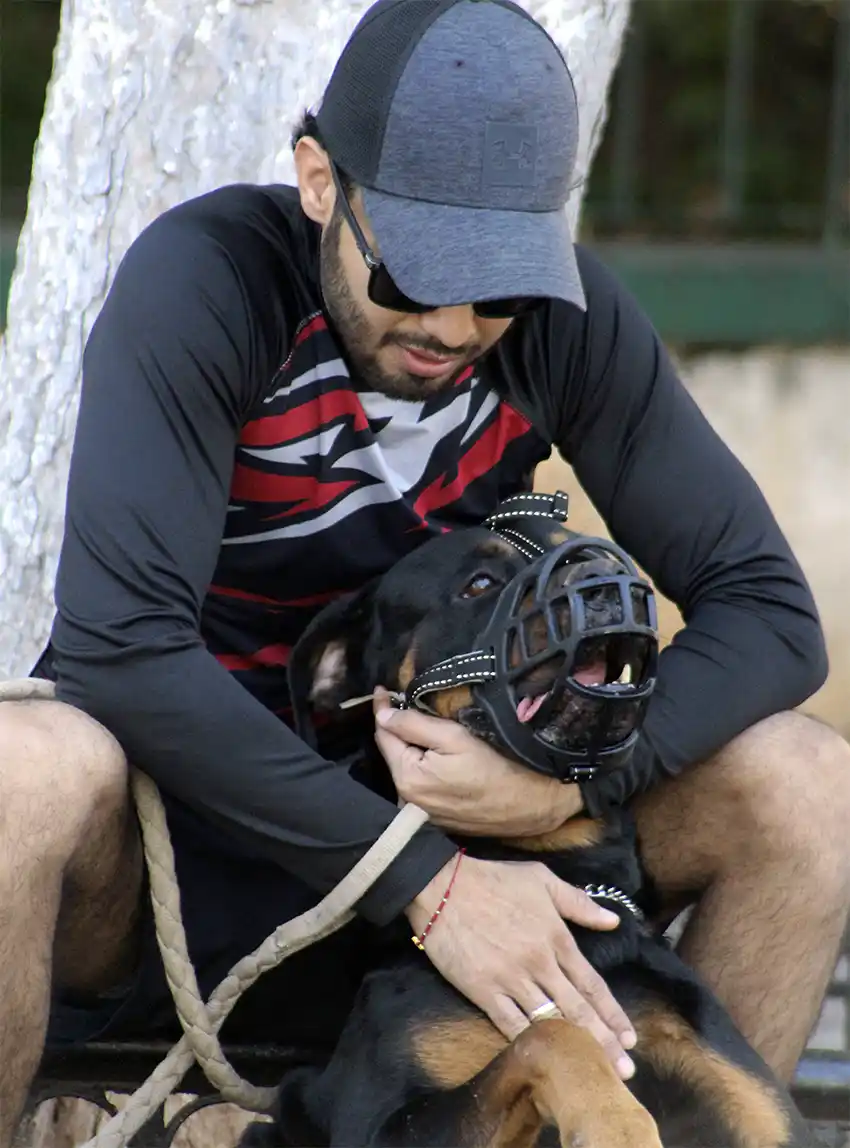
All dogs need consistency in their life to feel safe and secure. It's up to you to ensure you provide this structure and set some rules and boundaries to ensure your Rottweiler receives the very best education possible.
Sometimes the only solution is professional training and Bark Busters are here to help and support you long term, if you feel that your dog needs some expert assistance.
For example, every time you approach a door the human should always be the first one to walk through the door and then your dog, but only when you say it's okay to do so. As you read this, I can hear some saying, "but this has been debunked. It makes no difference if I go through the doorway first". We would disagree. We would not allow our small children to rush through doorways ahead of us because we do not know the dangers that could be on the other side. Therefore, we should not allow our dogs to do this either, for the same reasons.
Choose the same word every time, to let your dog know when they can walk through. The word 'free' works best as it's not a word you would use a lot during normal conversation. If your dog anticipates the 'free' word and rushes through the door before you have said it, then bring your dog back and repeat the exercise. Your dog must learn to take direction from you and know that they are not the one making the decisions.
This also helps to apply your leadership too. This might sound like a trivial thing, but in the 'dog world', the leader always leads and doing this sublimely lets your dog know that you are in control, and you are leading.
Another example of what we are talking about here is, do you allow your dog on the couch? If you do, then what rules will you set? Will you only allow them on the couch when you invite them up, or can they hop up on the furniture anytime they like.
If you are not going to allow them on the couch at all, even when you are sitting on the couch, then you need to ensure that this is a rule and that you consistently hold to that rule, regardless of what your dog tries to do.
Puppy Selection
If you are looking for a Rottweiler puppy, you should choose a reputable breeder or choose to rescue a lucky dog from a shelter group. Contrary to opinion, shelters work hard to match the right owners with the right dogs. Most dogs are abandoned for the wrong reasons which usually stems from the dog owner unable to control their dog. Shelters give their dogs health checks to make sure they are in good shape, up to date with vaccinations and will make you aware of any behaviour problem. Bark Busters trainers work with many local rescue shelters to help dogs overcome any behaviour problems before the dog is adopted.
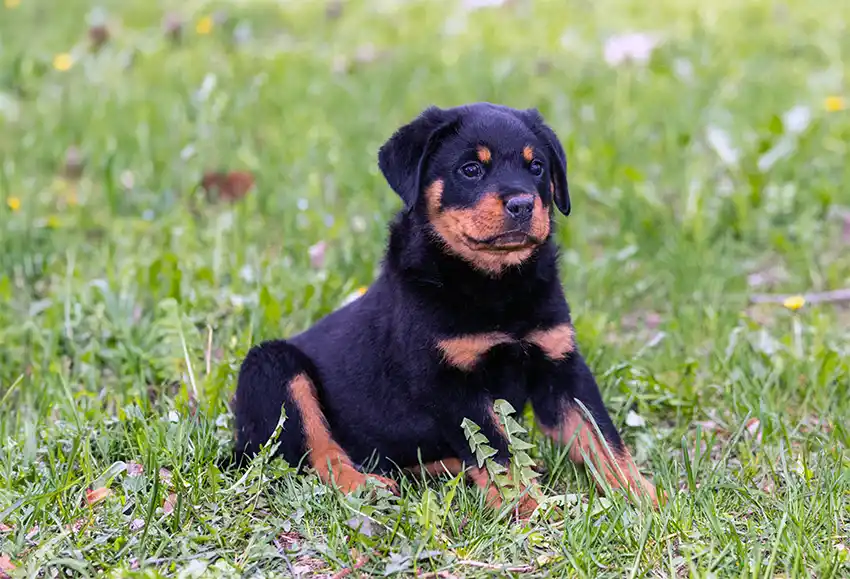
A good breeder will, as much as possible, try to screen out all the health problems inherent to the breed. They should be happy to answer your questions about temperament and health considerations and should ask you questions about your lifestyle and goals. Many breeders are registered with the Kennel Club, where they abide by certain policies and screening.
No matter what route you decide, here are some questions to ask before you select a puppy or a dog from a rescue shelter.
- Why was the dog surrendered to the shelter?
- How's the dog around other pets?
- Does the dog react or seem aggressive with children?
- What is the dog's personality like?
- What do you know about the dogs Mum and Dad?
- Are there any health issues that you know of?
Before you decide on a puppy, ask yourself if you would be better off with an adult Rottweiler that is lower maintenance and lower energy. Puppies are fun, but they are also a lot of work.
Whether you acquire a puppy or adult dog make sure you take your dog to the vet soon after adoption to identify and prevent any problems.
It is better not to choose two puppies from the same litter because of sibling rivalry. Likewise, it is better to have a female and male to reduce fighting.
Four Basic Needs
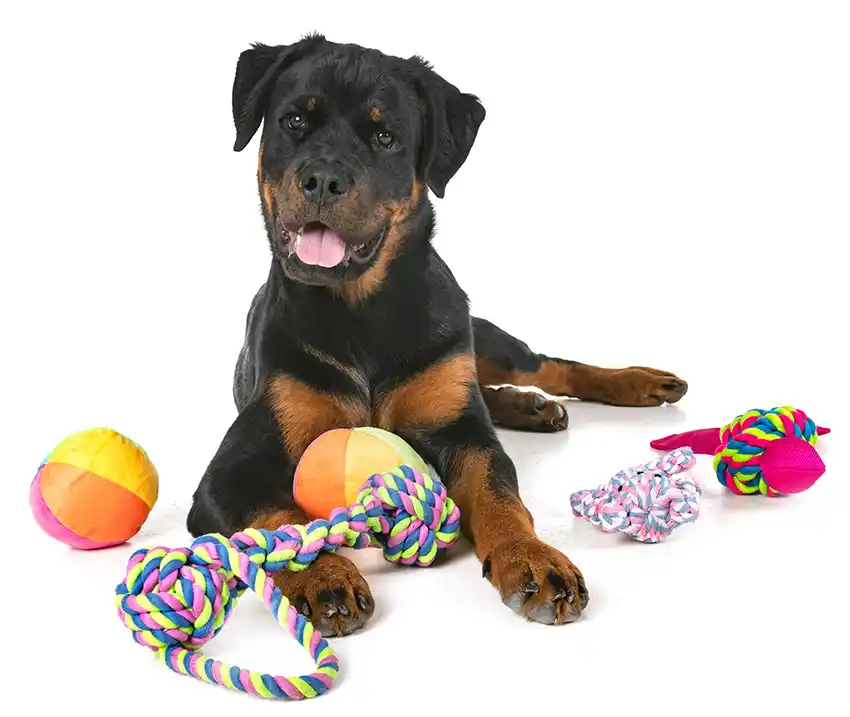
As a responsible dog owner, your dog depends on you for four basic needs.
Let's examine those four basic needs and why your dog needs them to keep it healthy, balanced and content.
Food - diet / nutrition
This breed is in the "working class" breed, therefore, it needs a good quality protein-based food with real meat versus byproducts or meals with added carbohydrates (such as brown rice) for energy. Rottweilers love food, so they are prone to becoming overweight, so carefully monitor their calorie consumption and their weight.
Some dogs can be pretty picky about their food, but the Rottweiler is not normally one of them. Consult with your veterinarian about which brand of food you should purchase, or which raw diet is best for your dog. Your dog's diet is important to meet his nutritional needs and to maintain his overall health. As they are so small, you don't need a lot of food to fill them up!
We promote a diet that is grain free, low in carbohydrates and without any harmful e-numbers, colours and preservatives. Carbohydrates do add energy that the dog needs to burn off and can make an already hyperactive dog more active.
The right diet, grain free and filled with fruits, vegetables and raw meat will have advantages to how your dog will feel, look and act.
If you want to understand why grains can make a dog more energetic, you only need to think of racehorses and how their trainers give them grain to get highly energetic racehorses. Energy in, equals energy out.
Bark Busters dog trainers are not vets or dietitians, so we urge you to do your own research into the best diet for your dog. A diet that you will be comfortable with.
We do however have vast experience of how highly concentrated grain diets effect behaviour and can cause hyperactivity. This is very prominent in Japan, where most dogs are fed high levels of rice in their diet which can adversely affect concentration and focus.
Safety - through leadership and education
All dogs need strong leadership and to know where they fit into the family unit. If they know they have a leader that will make all the decisions, one who is fair and just, they will be happy and content.
On the other hand, if they have no structure in their life, they have inconsistency, and don’t know how things will be from one day to the next, then they will become stressed and may experience health ailments, skin and stomach issues and behaviour problems. Routine and respect must be established. With equal doses of love and structure your dog will feel safe and secure.
Your dog just wants to please you but many times he doesn't know how. If you don't quickly establish yourself as the leader, a Rottweiler will gladly assume this role and chaos could follow.
Shelter - a place to call their own.
Provide your dog with its own "den", a place where they can call home, and somewhere they can go to for a bit of peace and quiet. Just make sure their "den" is warm, easy to clean and maintain.
Entertainment - toys and games
A very important part of your dog's four basic needs is their need to have something to do. If we want to avoid our pets becoming bored and destructive, then they need a way to fill their day.
Dogs thrive with physical and mental exercise. Dogs are highly intelligent animals, and they need to keep their brains active as much as their bodies. Entertainment is an important part of their well-being and essential to your dog's overall mental health.
One great toy is the Bark Busters GameChanger® which helps to prevent boredom, stress, and separation anxiety. By filling it with small treats, your dog will have plenty of fun trying to get the treats to dispense.
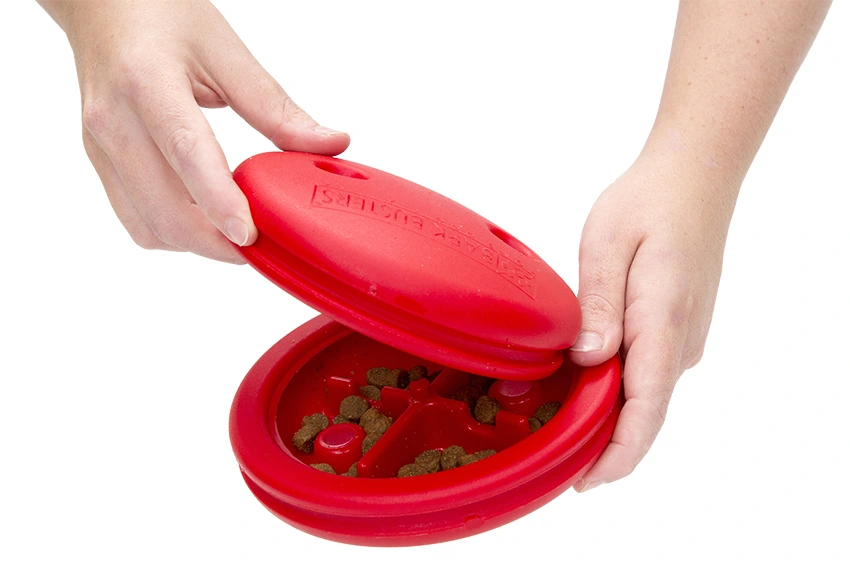
Games to Play
Hide the treat -
This game can be played indoors or outdoors. Put your Rottie in another room so they can't see you. Hide some kibble where your dog can't easily spot the food. Like an Easter egg hunt, see how many small portions they find. Rottweilers have often been used as detection dogs so you can simulate their senses with cardboard boxes. Hide some strongly scented food in a cardboard box, then mix the cardboard box up with other cardboard boxes. Praise your dog when they find the right box.
’Tug of War’
Is okay, and playing ball is good, provided your dog is not the type that gets fixated on the ball and refuses to stop playing when requested. Hide and seek is a great game too. These are games where you hide things from your dog, toys or a tennis ball and then encourage them to find the items. You can increase the degree of difficulty as your dog gets better at the game.
Start out where your dog sees you hide the toy, then repeat over and over like 'Find' or 'Seek'.
Remember to give a lot of praise when they find it. These type of games are more calming than those type of games that encourage your dog to become over-excited.
Child’s Play
Rottweilers do need to be controlled around children or they might hurt them with their overexcitment. They do learn quickly, so spend time educating them on what is good and what is not. If you are patient and understanding of their capabilities, you will be able to enjoy many great times, as a family, with your dog.
Interactive Toys
Bark Busters has the ultimate toy for all dogs that provides dogs with several options. The GameChanger® by Bark Busters is an interactive puzzle toy that delivers a treat. It's a chew toy, that they can carry around and take to their bed. They can't rip it apart like many other toys. It's a workout toy, that they flip over with their nose and scratch it with their paws. The GameChanger® will give your dog lots of fun and mental stimulation.
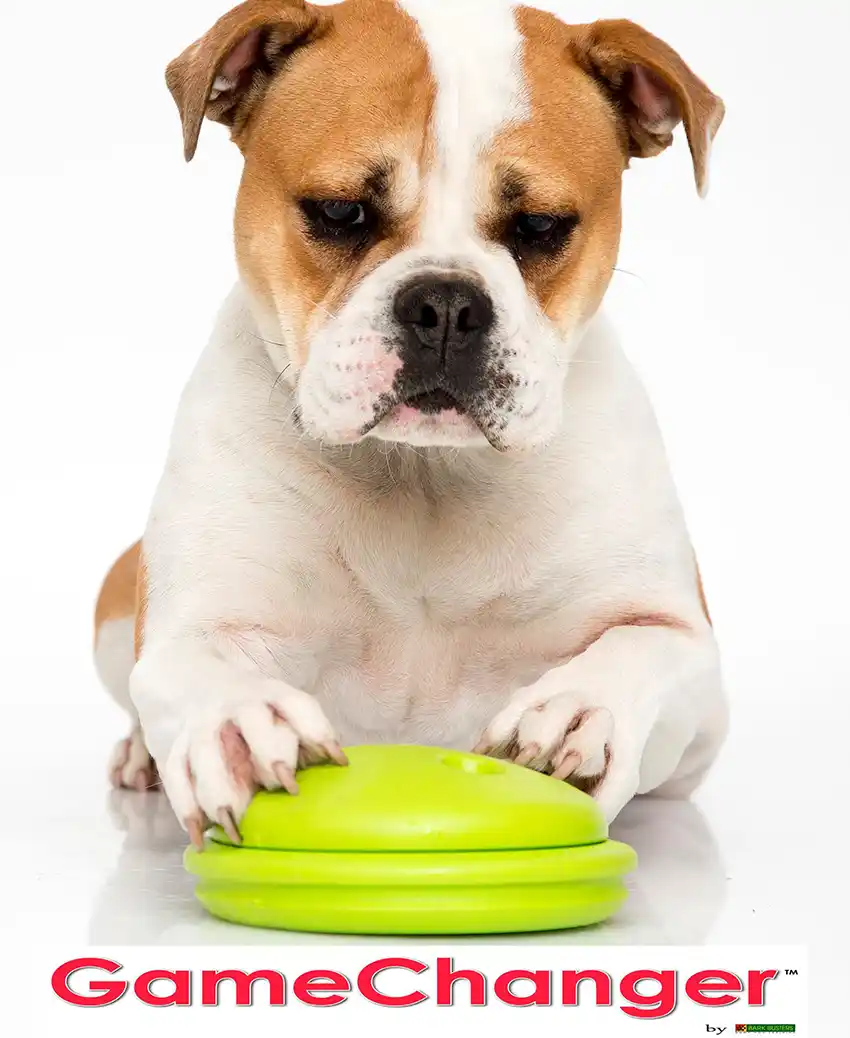
The Rottweiler is a breed that loves its food. It will love this toy and it will give your dog hours of endless fun while it works out the puzzle and how to get the treats out.
Overweight dogs can be fed out of this toy too. It provides much needed exercise while the dog gets the meal in a timely manner.
See the GameChanger® in action! It is made from Flexa-Pure, a soft but sturdy, durable non-toxic BPA-free polyurethane material. If your dog tosses it around your hardwood floors, it's even quiet!
Dog Parks
Taking Your Rottweiler to Dog Parks
Dog parks are one of the most misunderstood dog activities of the modern-day dog world. Some doggie parents love nothing more than to take their dog to a dog park. They have been told they need to socialise their dog and so off they go.
They love the fact that their dog has fun, they get to meet other dog lovers and watch the dog's romp around and play.
That is the upside, but the downside is there are those dog lovers whose dogs don't fit into this world at all. They are those dogs or puppies that were bullied, frightened on their first visit or whose personality does not fit the mould.
These folks agonise over the fact that their dog or puppy does not look forward to its trip there, it hides under the seat of the car, or it has to be carried or enticed into the park.
Many ask us why their dog acts like this and how they can fix it?
Bark Busters do have ways to assist these pet parents, but we do also explain why their dog might not like the dog park because of its personality.
It reminds us of a friend of ours who visited us regularly with her little dog, 'Harry'.
When they would arrive, Harry would walk up to each of us, sniff our legs and walk away.
She questioned us one day on why we never petted Harry when he came up to us.
We explained that this was not what Harry was doing, he was sniffing us, not requesting a pat. If he had been requesting to be petted, after sniffing us, he would have gestured to us to pet him. He did not do that, instead he walked away.
We told her that Harry was not a social dog and preferred not to be touched by anyone other than her and he avoided any interaction with our dogs too. He was a 'one person' dog that did not feel comfortable around others.
It was like a light had been turned on, our friend smiled and told us that this explained a lot to her. She further explained that every time she took Harry to the dog park, that he could not wait to get back to the car when it was time to leave, that he would stand away from the other dogs, never join in the play and snap at other dogs when they came near him.
He was telling her in every way he could that he did not fit into that dog park crowd, just like some humans hate parties!
Bark Busters Lifetime Support Guarantee
Bark Busters dog behaviour therapists and trainers have trained more than 1 Million dogs worldwide and are renowned authorities in addressing dog behaviour with all-natural, dog-friendly methods. The Bark Busters training is the only service of its kind to provide International dog training guaranteed lifetime support. With hundreds of trainers around the world, Bark Busters continues its mission to enhance the human/canine relationship and to reduce the possibility of maltreatment, abandonment and euthanasia. Contact your local Bark Busters dog trainer to see how they can help.
This article is the copyright of Bark Busters® and is intended for information purposes only. Dog owners should fully research any problems that they may have with their dogs.

